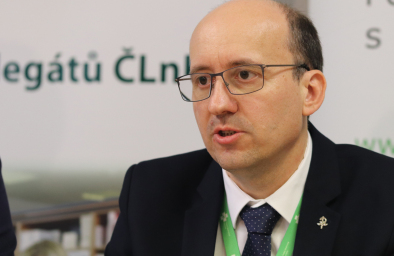Addressing the drug shortages, access to care, prevention and sustainability of healthcare – these are the four priorities of the government, which were discussed by the Prime Minister of the Czech Republic Petr Fiala at the 2nd annual Technology and Innovation in Healthcare Summit of the Healthcare Daily. The future Czech healthcare system must be stable and robust enough to cope with the onslaught of a possible next pandemic or other stress tests, as well as efficient and flexible enough to take advantage of digital tools and new technologies, he said.
The first of the priorities that Prime Minister Petr Fiala mentioned is to address the shortage of medicines. „We have faced a period of instability in the supply of antibiotics and some other medicines. The situation was very socially sensitive and caused concerns, some of them justified. The mismatch between supply and demand was a symptom of more general upheavals and one of the consequences of the covid pandemic, which disrupted supply chains and indirectly weakened our immunity. The whole world was struggling with increased consumption of medicines. In the Czech Republic, the numbers speak clearly: in the first five weeks of this year, more than half as many packs of antibiotics were dispensed as in the same period in 2022, and more than in the time before covid,“ said Prime Minister Fiala.
As a result, the government had to do what it does not normally do, which is to ensure an adequate supply of medicines. As a result, an emergency supply of medicines was secured and hundreds of thousands of packs of antibiotics for adults and children have arrived in the Czech Republic. A working group has also been set up at the Ministry of Health, which regularly publishes a review of the situation for doctors and pharmacists, including recommendations on available alternatives. At the same time, an amendment to the Medicines Act has been prepared – now being in the legislative process – which would make manufacturers to keep a two-month supply of medicines in case of a shortage.
„The steps that we have taken, and those the manufacturers and distributors of pharmaceuticals have taken with us, have prevented us from getting into a situation where people would not have the medicines – or similar effective alternatives – they needed. Given the positive developments, the market should stabilize completely over the next few weeks,“ believes Fiala.

Another topic that the Prime Minister said needs attention is access to healthcare. Today, we recognize the problems especially at practitioners for children, but also for adults, and at dentists. This is doubly true in the remote regions.
„Today, fortunately, we don’t have compulsory allocation or similar tools that the government can use to keep doctors in a certain place or even send them there, and I hope we don’t come to something like that in this country under any government. The primary responsibility for the availability of healthcare in our system lies with the health insurance companies, and if there is a shortage of doctors in a region, it is the insurance company that should respond to that – and I know from my discussions with Mr. Kabátek, the CEO of VZP, that they are creating incentives to get and keep doctors in the regions. Nevertheless, as a government we are aware of this problem and are looking for ways to mitigate it with the tools at our disposal,“ explained Prime Minister Fiala.
Mohlo by vás zajímat

He said the government can ensure a fair environment and also strengthen motivation. Therefore, the Ministry of Health adjusts the education of pediatricians and emits residencies for specialties in which there is a shortage of doctors. It has also asked hospitals that have accreditation for pediatrics to release their trainees for primary care practice as soon as possible.
The government’s third priority is prevention, with the aim of prolonging healthy lives. „While life expectancy in the Czech Republic is increasing, the number of years we live in good health has unfortunately been stagnating for a long time. The typical Czech citizen develops a serious illness after the age of 60 and then spends the rest of his or her life with it. That is why we want prevention to become a dominant component of health policy, to be universally available and to effectively prevent the onset and development of serious diseases wherever possible,“ emphasises Petr Fiala.

At this point, he mentions a novelty that allows insurers to have more money in their prevention funds. According to the Prime Minister, the healthcare system should also motivate citizens to participate in prevention programmes, while at the same time operate efficiently. This includes facilitating communication between doctors, hospitals and patients, reducing unnecessary and repeated examinations or sharing medical records as part of digitalization.
The last priority highlighted by Prime Minister Fiala is ensuring the long-term sustainability of the healthcare system. All of the above-mentioned steps understandably contribute to this, but according to him, sustainability must be ensured over a period of decades so that the healthcare system is prepared for demographic changes, new technologies and other challenges.

„This will undoubtedly require parametric adjustments, which we are already doing, but it will also require more extensive reform. We will undoubtedly have to change primary care, nursing and prevention, including the improvement of health literacy,“ Fiala points out. He points to the introduction of regular indexation of payments for state insured persons as an important step that has already been implemented.
„We need to focus on the sustainability of the healthcare system so that we can develop all the potential that the healthcare system has in the future and give citizens hope for a few extra healthy years of life. At the same time, the health system must be stable and robust enough to cope with any new challenges, such as a covid pandemic or other stress tests. At the same time, it needs to be efficient and flexible to take advantage of new technologies and digital tools – which is also the theme of today’s meeting. I therefore very much welcome the fact that this conference deals with highly topical issues such as innovation, information systems, telemedicine and the financing of the latest therapies. This is important so that we make the right political decisions and contribute to the sustainability of the whole system. I hope that by combining prevention and new technologies and procedures we will be able to prevent more problems than just dealing with the consequences,“ concludes Petr Fiala.


Foto: Radek Čepelák
-mk-
The Healthcare Daily would like to thank Roche, Zentiva, ORCZ, Medtronic, Medicalc, Novartis, Alk, Akeso, EUC, MyCom, Satum and the health insurance companies VZP, ZP MV and RBP for their support.







